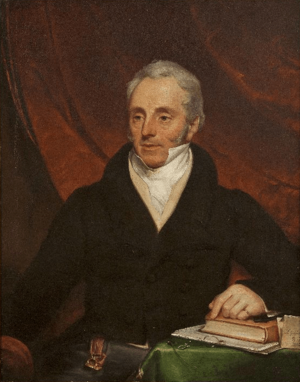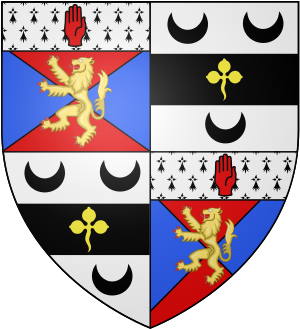Arthur Guinness II facts for kids
Quick facts for kids
Arthur Guinness (II)
|
|
|---|---|

Portrait by Martin Creegan.
|
|
| Born | 12 March 1768 Beaumont, Dublin, Ireland
|
| Died | 9 June 1855 (aged 87) Beaumont, Dublin, Ireland
|
| Nationality | Irish |
| Occupation | brewer, banker, politician |
| Known for | Guinness Brewery |
| Spouse(s) |
Anne Lee
(m. 1793; died 1817)Maria Barker
(m. 1821) |
| Children | Revd. William Guinness Arthur Guinness Sir Benjamin Guinness, 1st Baronet Susanna Darley Elizabeth Jameson Rebecca Waller |
| Parent(s) | Arthur Guinness |
| Family | Guinness |
Arthur Guinness (born March 12, 1768 – died June 9, 1855) was a very important Irish businessman. He was a brewer, banker, and politician who lived and worked in Dublin, Ireland. To avoid mixing him up with his famous father, who was also named Arthur Guinness, he is often called "the second Arthur Guinness" or Arthur Guinness II.
Contents
Early Life and Family Business
Arthur Hart Guinness was the second son of Arthur Guinness and his wife, Olivia Whitmore. He was born at their home, Beaumont House, which is now part of Beaumont Hospital, Dublin. Arthur went to White's Academy in Grafton Street, Dublin.
He started working at his father's St James's Gate brewery in the 1780s. His father, who was 65 at the time, once wrote that Arthur's help was key to growing the brewery. He needed to provide for his ten children.
When Arthur married Anne Lee in 1793, the brewery's lease was set up so he would take over the business. This showed he was meant to lead the company after his father passed away. His younger brothers, Benjamin and William, also worked at the brewery.
In 1782, his father also started the "Hibernian Mills" near the River Camac in Kilmainham. This mill made flour for Dublin's growing population. This was thanks to more Irish exports and trade, supported by the Irish Patriot Party, which the Guinness family liked.
Leading the Brewery
When his father died in January 1803, Arthur and his brothers Benjamin and William Lunell formed a business partnership. They called their company "A. B. & W.L. Guinness & Co, brewers and flour millers." Arthur bought Beaumont House from his older brother, Hosea. In 1808, they bought their first steam engine to pump water.
The brewery grew a lot! Sales went from 360,936 gallons in 1800 to over 2.1 million gallons by 1815. There was a dip in sales after that, but the business recovered.
The brewery stopped making ale around 1799 and focused on porter. From the 1820s, they made stronger kinds of porter, like "Extra Superior Porter" or "Double Stout". These were popular for export to Britain. Even famous people like Benjamin Disraeli enjoyed Guinness.
The brewery also benefited from different taxes on malt in Britain and Ireland. This helped Arthur export more to Britain. Because of this, Arthur became a supporter of the union between Britain and Ireland.
By the time Arthur died in 1855, the St James's Gate brewery was making and selling 78,000 large barrels (called hogsheads) each year. This was about 4.2 million gallons. More than half of this was exported, mostly to Britain.
Helping the Community
Arthur Guinness was also very generous and supported many good causes. He was a trustee or sponsor for several organizations, including:
- The Meath Street Savings Bank
- The Catholic Association (1823–1829)
- The Society for Improving the Condition of the Poor
- The Hibernian Bible Society
- The Meath Hospital
- The Bethesda Locks Penitentiary (a place that helped people in need)
Both Arthur and his wife were on the governing committee for the Bethesda Locks Penitentiary. He also helped pay for Nelson's Pillar, a famous monument built in Dublin. Arthur was a Low church Anglican, which means he had a certain type of Protestant Christian belief.
His Banking Career
When brewery sales dropped between 1815 and 1820, the company relied on money from its flour mills. The mills had burned down in 1806 but were rebuilt. They were later leased out and then sold in 1838.
Arthur also became very interested in banking. He joined the "Court of Directors" of the Bank of Ireland in 1804 and stayed there until 1847. He even became the Governor of the bank from 1820 to 1822. The bank's main office was in the building that used to be the Irish Houses of Parliament. In 1825, Arthur tried to allow Catholics to become bank directors, but he wasn't successful at that time.
He was also the chairman of the Dublin Chamber of Commerce for many years, from 1826 to 1855. He was part of the Ouzel Galley Society, which helped settle business disagreements. Arthur was also a member of Dublin Corporation, the Dublin Brewers' Guild, and the Royal Dublin Society.
Even though Dublin's trade faced challenges after the Act of Union in 1801, Arthur continued to succeed in banking. Because of his connections, he was one of the Dubliners chosen to welcome King George IV when he visited the city in 1821.
His Marriages and Children
Arthur Guinness married Anne Lee at St. Mary's Church, Dublin on May 7, 1793. Anne (1774–1817) was the daughter of Benjamin Lee, a builder and brickmaker from Dublin. Arthur and Anne had nine children together, including:
- Revd. William S. Guinness (1795–1864), who became a clergyman.
- Arthur Lee Guinness (1797–1863), an art collector and brewer.
- Sir Benjamin Lee Guinness, 1st Baronet (1798–1868), who became a brewer and a Member of Parliament.
- Susanna Guinness (1804–1836), who married Revd John Darley.
- Elizabeth Guinness (1813–1897), who married Revd William Jameson.
- Rebecca Guinness (1814–1870), who married Sir Edmund Waller.
After Anne passed away, Arthur married Maria Barker in 1821. They did not have any children together.
In 1804, Arthur's brother Benjamin married Rebecca Lee, who was Anne's sister. Their daughter Susan later married Arthur's oldest son, William, in 1826.
Passing on the Business
The late 1830s were a time of change for the Guinness family business. The family's flour mill was sold in 1838. The business partnerships with his brothers ended by 1840. Arthur's oldest son was a clergyman, and his second son, also named Arthur, left the brewery in 1839.
After this, his third son, Benjamin, took over managing the brewery from 1839. Arthur, who was around 70 years old by then, was only involved in the biggest decisions. When Arthur died in 1855, Benjamin became the sole owner of the business. Later, Benjamin's third son, Edward, would become the sole owner in 1876.
His Political Ideas
Arthur supported Catholic Emancipation (giving Catholics more rights) from the 1790s. However, he did not support the Society of United Irishmen, a group that wanted to break away from British rule. Before the 1798 rebellion, he was against violence from both sides. He believed that giving Catholics full rights and reforming Parliament would solve the problems.
In a speech in 1797, he said he was sad about "the strong measures" used to stop trouble. He suggested that removing barriers for Catholics and reforming Parliament would lead to peace. The Dublin Catholic Board later thanked him and his brothers for their support of Catholics in Ireland.
Arthur was elected to Dublin Corporation (the city's government) as one of the four members from the Dublin Brewers' Guild. He chose not to run for a seat in the House of Commons (the British Parliament). He told his son Benjamin that being a politician for a big city like Dublin, especially with all the political arguments, would be difficult and risky for someone in their business.
In 1829, he helped raise money for Daniel O'Connell, a leader who fought for Catholic rights. Arthur also spoke at a meeting in 1831, supporting what became the Reform Act 1832, which changed how people voted. He said that "Reason and intelligence were on their majestic way" and that governments should be for the good of the people.
However, Arthur's support for Daniel O'Connell changed during the 1837 election. Arthur voted for the conservatives, and from then on, he was against O'Connell's idea to repeal the Act of Union. O'Connell was disappointed, saying he thought the Guinnesses had "a better spirit."
During the Great Famine in the 1840s, Arthur asked his son Benjamin to donate to help the starving people. He said his "purse is open to the call." We don't know exactly how much they donated. This was different from O'Connell, who spoke about the famine but achieved little. The government's policy at the time made the famine worse by not sending enough emergency food.
Retirement and Death
After helping the brewery grow its exports a lot, Arthur retired to Torquay in the 1840s. He still visited Dublin sometimes. He died at Beaumont in 1855, at the age of 87. He was buried at Mount Jerome Cemetery. His funeral was a large event. His estate was valued at £180,000, which was a very large sum of money at the time.
See Also
- Guinness family
|
 | Chris Smalls |
 | Fred Hampton |
 | Ralph Abernathy |


